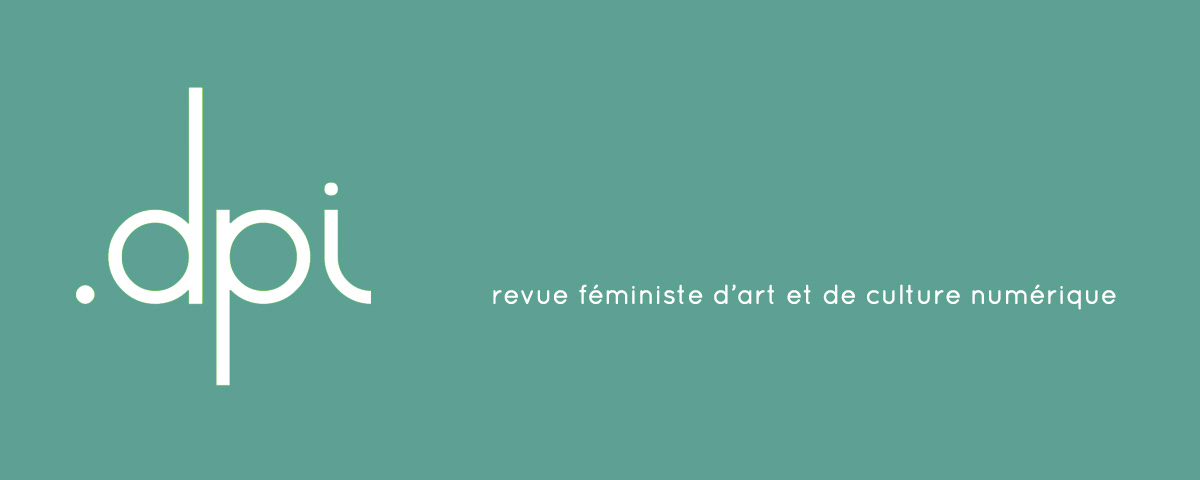Electronic journal .dpi re-imagined | Call .dpi 27: Hacktivism
Participants

Themed Section: Hacktivism
Guest Editor: Christina Haralanova
Proposal deadline: March 11, 2013
Founded by Studio XX in 2004, electronic journal .dpi has recently undergone an important process of transformation with the goal of reaffirming and re-focusing its role as a feminist journal on art and digital culture.
In 2013, benefiting from the ongoing support of Studio XX’s administrative and technological resources, .dpi acquires the status of an independent project with a new platform and a renewed editorial team, including Sophie Le-Phat Ho, as permanent editor-in-chief, and an editorial committee composed of Julie Alary Lavallée, Amber Berson, Esther Bourdages, Christina Haralanova, Corina MacDonald, Katja Melzer, Candace Mooers and Deanna Radford.
Based in Montreal as an online journal, .dpi opens up a unique and bilingual space for dialogue and interdisciplinary critical reflection, research, experimentation, documentation, and positions and propositions situated at the intersection of art, technology and feminisms. The journal is a platform where the bold, critical, engaged and curious contributor may question issues related to feminism (in all its varieties), art and digital culture.
.dpi 27 Call for projects
For this very special next issue, .dpi seeks proposals that reflect its renewed mission.
As part of issue 27, .dpi launches an open call for a themed section on hacktivism (see below) guest edited by Christina Haralanova, a researcher interested in work that intersects feminist and techno activism, such as women’s contribution to free and open source software development.
Proposals for submissions that fall outside of the theme are also welcomed.
.dpi 27 will be launched in April 2013 in its new platform and website. A special launch event will take place (details to come).
Themed Section: Hacktivism
Guest Editor: Christina Haralanova
Hacktivism: the Art of Practicing Life and Computer Hacking for Feminist Activism
Hacktivism fuses hacking and activism indicating the use of technical expertise, such as computer programming skills, for social activism and political action. In other words, hacktivism is described as hacking with a political purpose, and does not limit itself to the largely mediatized sense of disruptive online actions.
Hacking is often used to indicate activities related to electronics, computer hardware and software in the spirit of DIY (Do-it-Yourself) experimenting, testing, improving, and repairing of technological devices. Hacking can take different forms: from computer security and engineering to travel, radio, bike and food hacking. In a wider sense of the word, a hacker refers to a state of mind, in which one strives to learn how things are made by repairing, repurposing and improving them. This more inclusive definition considers not only programmers, but also geeky individuals.
Despite its popularity, of all the activities around technology, hacking is the one least visited by feminist geeks and professionals who self-identify as women. Perhaps the lack of documentation and research on the subject amplifies this observation. Yet learning technical skills on one’s own or in groups, organizing or participating in discussions, experimenting informally with hardware, software and electronics, are all part of a feminist approach to DIY learning. With this 27th issue, .dpi wants to give more visibility to hacktivism used by women and feminists as a tool for change and to investigate the various forms it can take.
The call is open to practitioners and researchers interested in such issues as political aspects of technology, information governance, gender and hacking, hacktivist art, or feminist and strategic uses of technologies.
How to submit a proposal
.dpi is looking for proposals relevant to (or stemming from) “the Web”, including text, image, sound, video, animation, interactive works, etc., and any combination of these, produced collaboratively or individually. Please send your proposal (maximum 300 words), a short biography (100 words) and a CV (per person involved) by Monday, March 11, 2013 to: revuedpi(at)gmail.com (Successful applicants will need to hand in their contribution by April 8.)
Types of submissions include (but are not limited to) short essays, criticism, interviews, case studies, reviews, reports, creative works (or extracts), and other imaginative responses. Text length can vary between 500 and 1500 words (maximum), depending on the form and the media used. An honorarium is offered depending on the length and complexity of the contribution. The authors and artists are responsible for all copyright related to the submitted content. If you are applying with an artwork, it must be completed by the date of submission and included with the proposal.
In addition, if you want to get involved in the process of shifting the model and mandate of .dpi and help support the editorial team, get in touch with us! revuedpi(at)gmail.com